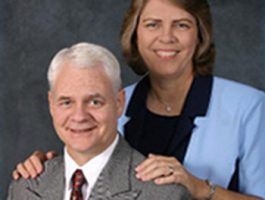
Making it Through the Storms of Life
In this life you will have trouble, but take heart, I have overcome the world. Jesus gave these words of hope to his disciples before ascending into Heaven. We reflect on His words as we share "storm stories" of other believers, and how they walked through their own storms with hope in Christ alone.
Show Notes
About the Host
About the Guest
-
- More from John and Donna Bishop. https://www.familylife.com/podcast/guest/john-and-donna-bishop/
- Depression: A Stubborn Darkness with Ed Welch and Leslie Vernick. https://www.familylife.com/podcast/series/depression-a-stubborn-darkness/
- Kara Tippetts' blog. https://www.mundanefaithfulness.com/ and books including "Just Show Up" https://www.mundanefaithfulness.com/books/
- Check out all that's available on the FamilyLife Podcast Network. https://www.familylife.com/familylife-podcast-network/
- Learn more about becoming a Legacy Partner, a monthly supporter of FamilyLife. https://www.familylife.com/legacy
-
Michelle Hill
Radio has been ingrained in Michelle for most of her life. This love for radio has taken her to various radio stations and ministries in places like Chicago, Alaska and other snow covered terrains like her hometown in north central Iowa. In 2005 she landed on staff with Cru/FamilyLife®. While at FamilyLife she has overseen the expansion of FamilyLife Today® internationally, assisted with the creation of Passport2Identity™-Womanhood and is now the host of FamilyLife This Week®. For the last 15+ years Michelle has been mentoring young women and is passionate about helping them find their identity in God. She also has a fascination for snowflakes and the color yellow. Michelle makes her home in Little Rock, Arkansas.
-

Chonda Pierce
Emmy® -nominated and best-selling comedian Chonda Pierce or “the country comic” as Billboard Magazine dubbed her, has been making audiences laugh for more than two decades with her winning combination of fierce wit and southern charm. Pierce is fresh off an incredible year after debuting her movie “Chonda Pierce: Laughing In The Dark,” to rave reviews from audiences and critics alike. The limited engagement documentary-style film was so well received that it was brought back for a very...more
Ed Welch
Edward T. Welch, MDiv, PhD, is a licensed psychologist and faculty member at CCEF. He earned a PhD in counseling (neuropsychology) from the University of Utah and has a Master of Divinity degree from Biblical Theological Seminary. Welch has been counseling for over forty years and has written extensively on the topics of depression, fear, and addictions. His biblical counseling books include Shame Interrupted, When People Are Big and God Is Small, Addictions: A Banquet in the Grave, Depres...more
John and Donna Bishop
In October 1995, Pastor John Bishop lost his memory to Aseptic Meningitis. His wife, Donna, stood by his side helping him to learn how to walk, talk, read, and write all over again. He has gone on to found God Is So Good Ministries traveling the country to speak as well as maintaining a Christian Bible Camp. The Bishops reside in Rosebud, Arkansas.
Leslie Vernick
Leslie Vernick is a licensed counselor and coach with over 30 years experience helping individuals and couples. Leslie gently leads her clients and connections to: *Discover the courage to deal with destructive relationships Heal from a negative self-image or poor self-esteem *Confidently speak thoughts and feelings in a constructive way Encounter God’s peace in the midst of suffering or difficult loss *Develop the discipline to turn dreams and desires into realities She and her husba...more
We share “storm stories” of other believers, and how they walked through their own storms with hope in Christ alone.
Making it Through the Storms of Life
Michelle: So what does life look like for you right now?—is it sunshine and roses?—or is there a storm brewing? Here is Chonda Pierce.
Chonda: It’s one thing to say how much you love Jesus when everything is going right and good. It’s another to really feel His love when everything is going wrong; but it’s when your heart is broken, and your feelings are raw, you go straight to the Word of God; and you have to trust that those words are true.
Michelle: There is a saying: “Every storm eventually runs out of rain.” We’re going to talk about getting through the storms on this edition of FamilyLife This Week.
Welcome to FamilyLife This Week. I’m Michelle Hill. You know, I love a good thunderstorm. I love when it rolls and shakes the earth a little bit; but pretty soon, I’m ready for it to get over with. I don’t want it to last day in and day out. You know, suffering is like that; most of us want it to be over pretty quick. Paul, the writer of Romans in the Bible/he says, “Rejoice in our sufferings knowing that suffering produces endurance, endurance produces character, character produces hope.” That hope—it doesn’t disappoint.
A while back, Dennis Rainey and Bob Lepine talked with a couple who had one of those stories. Now, this is an amazing story; I’ve never heard one like it. This story is about John and Donna Bishop, who have been married for over 40 years. They have raised three sons. The Bishops live near Heber Springs, Arkansas, where John is a pastor. You’ve heard the saying: “Changed in the blink of an eye”; well, the Bishops know that well.
[Previous FamilyLife Today® Interview]
Donna: We were pastoring a church there in Heber Springs, and we had a good church. I say it was a perfect life. You know, everything was great; we were just having a great time serving the Lord. All of a sudden, that night, he got sick. He was sitting in his rocking chair; he had his devotions over in the rocking chair. He just kept sitting and sitting there; I went over and shook him. He couldn’t wake up—he couldn’t—he was just kind of staring off. I said, “John, what’s the matter, John?” I was talking to him; he just couldn’t answer me.
John: When I woke up from meningitis, I did not know her. I didn’t know me/my name. I didn’t know—I really didn’t know anything. I had a very unusual case of amnesia. I didn’t just forget names and people; I forgot everything. I didn’t know what words were; that’s why I couldn’t read or write. I remember, when she told me what the Bible was—see, I didn’t know what I was either—I said, “What am I?” She said, “You’re a preacher.” I said, “What a preacher is?” [Laughter]
Donna: I kept thinking, “Okay, now, he’ll get it back.” He didn’t remember marriage or wedding, so I get a photo album out. I said, “Don’t you remember?” I tried to trick him to see, “Okay; I know he can remember something.” We just/I just kept trying to go back and—but he just doesn’t have anything.
Dennis: Now, what our listeners don’t know is the length of time this story took. I mean, we’re not talking about 30 days in rehab, back to John getting to normal. John, give our listeners an idea here of the timeline we’re talking about here.
John: Well, for several weeks, she had to do everything for me. You know what I mean—I say everything—I was like a baby. This went on for weeks and weeks. Like I say, it took me near two years to where I could walk. I had to work at, work at, and so forth; but it was just incredible how good she was to me. I remember one day, she finishing cleaning me up again. I look at her; I say, “Donna, why so good to me?”
She said, “Well, two reasons.” I said, “What that?” She said, “One, I promised I would.” I said, “Promise? I don’t remember promise.” She went and got our marriage vows, and she brought them. She said, “John, we got married. I said, ‘…in sickness and health/better or worse.’” I remember I said, “Donna, I’m so sorry at this worse but thank you keeping promise. Thank you.”
Then, she said, “But second reason is”—and she gave me big hug—and says, “I love you.”
Bob: John, when you started losing your eyesight, eight months ago, you had to think, “Lord, haven’t I had enough? I mean, couldn’t we just keep the eyes? That would sure be helpful.”
John: Yes; oh, Bob, that was one of the biggest struggles. I should have been able to ace that one after what I’ve been through; but I tell you—I struggled. At first, I couldn’t believe it happening. I thought, “Surely not.” Then I thought, “Oh, this just be two/three week; and the Lord say, “Okay; I just testing you”; but it went on, and on, and on.
I remember I tell God, “Okay; Lord, not my will, Thine be done.” Then I had to tell Him, “I sorry, Lord. I didn’t mean it,”—like I needed to tell Him; but I mean, I knew I would just saying the words—“Oh, God, I’m so sorry.” I finally got a point, “Okay, God; if You want the eyes too, that is okay. I really do mean it.” That really was a big struggle for me. I should have been stronger, but I wasn’t.
Bob: You know, the name of your ministry—
John: Yes.
Bob: God Is So Good Ministries.
John: Yes.
Bob: John, some of our listeners are going to hear this and say, “How can you, with all you’ve been through, testify to the goodness of God? If God was good, why would He allow all of this to happen to you?”
John: Yes; those questions were going through my mind. I needed to get hold of something; the truth I got hold of. I was listening to Bible on tape; but I really loved the Book of Psalms, because David been through some trials too. He kept saying, though, “The Lord is good,”—I’m not saying that all that God is: He is also holy; and He is just; and He is righteous—but the two things that stand out to me is He is good and He is right, no matter what happens. He is always good, and He’s always right.
Our God put Himself through pain when He gave His Son. They say one of the greatest pains a person can go through is the death of a child; but yet, He let Him go through greatest pain anybody ever through because something better. Now, I don’t have to know what all the better is; but I know I can trust this God because He let Himself hurt. Jesus suffered more than any of us will ever know; and if God love His Son, and let Him go through that, because He knew something better for everybody, I’m going to trust Him that He got something better for me and everybody too. You can trust a God like that, because He is a good God.
[Studio]
Michelle: Oh! Can you imagine losing everything and having to retrain and relearn everything? It’s almost a Job-like suffering. He had to learn the patience of Job, and to have faith, and trust that God would work, and heal, and redeem His life. That’s hard to have that Job-like faith.
You know, even—there are some kinds of sufferings that we don’t understand, like depression. We’re going to talk about depression. A while back, Ed Welch and Leslie Vernick had a chance to sit down with Bob and Dennis. Ed’s been a counselor for over 30 years, and he’s also the author of Depression: Looking up from the Stubborn Darkness. Leslie Vernick is a clinical licensed social worker; and she has written the book, Getting Over the Blues. Now, Ed knows, firsthand, what it is like to live with someone who has depression; here he is explaining life with his dad.
[Previous FamilyLife Today Interview]
Ed: I grew up with a man, who went through some of the early shock treatments in the United States. I had an opportunity to see depression fairly consistently—episodes that were very deep, at least, a couple of times a year—but I had a man who lived before me a persistent, preserving faith in the midst of those difficulties.
Dennis: How was he heroic?
Ed: He was heroic in the sense that his faith, unbelievably, didn’t seem to falter in the midst of that—which if people, who are depressed, they would find that heroic as well. As I see other people, who struggle with depression, that word, “heroic,” comes up to me all the time; because to seek, in a meek and humble way/to try to see Christ in the midst of that kind of pain is—demands a kind of faith that very few people have.
Bob: So when a person—I mean, here is how we normally think: “I’m a Christian. I’m experiencing depression. Those two should not go together; because ‘The joy of the Lord is my strength.’ I should be rejoicing in the Lord always—‘Again, I say rejoice,’—all of these statements—‘The fruit of the Spirit is love, joy…’” We keep hearing/we think a Christian ought to be one whose life is characterized by joy: “If I’m not feeling that/if I’m not experiencing that, is there something spiritually wrong with me?”
Leslie: Well, James tells us that we are to consider it all joy whenever we face troubles. If we face depression, how do we face it with joy? I’ll just do kind of a silly example; but when you are working out at the gym, nobody finds that pleasurable, for the most part. If you’re working hard enough, you’re not finding it pleasurable.
Bob: Amen!
Leslie: You’re suffering.
Bob: Amen!
Dennis: Bob, you’ve never even been to the gym. [Laughter] Don’t act like you’ve been there and experienced that. [Laughter]
Leslie: The way I kind of get my hands around this concept of joy is what keeps you enduring in the midst of that suffering is that mindset that something good is happening in you. You’re developing—
Dennis: —that there is purpose.
Leslie: —there is purpose; you’re developing strength; you’re developing muscle. Even if it’s for vanity’s sake, you are developing something inside of you; but spiritually, James uses that metaphor to help us to understand that joy isn’t this pleasurable, emotional high. It’s an inner sense of calm; it’s an inner sense of knowing that something good is happening in the midst of great suffering.
Dennis: You know, one of the things that, as we talk about depression, that hit me as I was reading both of your books, is depression is a form of suffering.
Now, Ed, I want to take you back to your dad. How did you see your dad suffer well?—because ultimately, that’s what you’re saying he did and how he practiced an heroic faith.
Ed: One, he would ask for help. Believe it or not, he would ask me, as a teenager, for help. He would ask me, as a teenager, to pray for him in the midst of his depression and feeling so miserable, which—I mean, how many fathers ask their son/how many fathers have the humility to ask their son to help them in such a way? That’s certainly one thing that I saw.
I mentioned his outward-ness. There was a persistent generosity in my father, financial and in terms of time, to people. This is not unusual to people, who were miserable people: miserable in that they felt miserable or their circumstances were miserable. He had a keen eye for people who felt like that.
One big old man I had a chance to speak to—a 75-year-old man—he has been depressed his entire life. There was the kind of person—you want to talk to him and just glean the wisdom he has received—his wisdom was really fairly simple. The question was: “Why did you get up every morning?” He said, “The reason I got up every morning was because I was called to love people, and I would look to love somebody every single day.” There, you want to take your shoes off and say, “I’m on holy ground.
Dennis: Right.
Ed: “The Spirit is here.”
Leslie: Well, certainly, I think that one of the things that depression does—and Ed, you speak to this quite well in your book—is that it really turns a person in on themselves. They become overly analytical/overly introspective. They examine every flaw that they have in life and everything that is wrong with them; but God wants us to look outward, fixing our eyes on Christ. Jesus did that as our example, so we’re to do that as well.
Dennis: Whether it’s steps or whether it’s strategies, both of you write about this. I’d like to explore some that you talk about in both of your books. Ed, you have—I’m looking here; you have 20 practical strategies that really appeal to me, as a man,—
Bob: —as a fixer. [Laughter]
Dennis: —who wants to fix it. [Laughter]
Now, I know we’re laughing about it, and I know we’re not just going to fix it; but there really are some good practical helps here. Again, Leslie, you have steps; so I want both of you to just share some practical strategies and steps.
Ed: Right; these strategies come from people, who have been depressed; so they’ve been used by folks. Here is one: “Be suspicious of how you feel. Be suspicious of how you feel.” In other words: “I feel like nobody loves me,” “I feel like God doesn’t love me.” Feelings—when they are as pronounced as they are in depression—they demand our allegiance; they demand some sort of interpretive power. “I feel like no one loves me,” becomes “No one loves me.” There is a huge difference between the two.
So number one: “How can we be suspicious of how we’re feeling?” Here is something, again, that demands great faith. How can we bring a humility to the process?—because depression is saying: “There is no hope,” “There is no purpose,” “There is no joy.” Essentially, what we’re doing is—we’re asking the person to have a protest against that and to say, “No! There is hope; there is purpose; there is joy.” That protest demands immense humility.
Leslie: One of the things dovetailing on Ed’s strategy is—I talk about our heart being comprised of our feelings, which is important to recognize; but also, the thought/feeling connection; because for example, the psalmist says in Psalm 55:2, “My thoughts trouble me, and I am distraught.” Our thoughts affect our feelings. When a person feels like they are abandoned, it’s because they are thinking that they have been abandoned. It’s very important for us to understand that, just because we think something is true, it doesn’t necessarily make it true. God’s Word is our plumb line for truth.
Even the Israelites felt abandoned by God in Isaiah 49, because they were telling themselves that God abandoned them. God took pains in that passage of Scripture to say, “Though you think this, it’s not true.” It’s very important for us to be able to understand that our heart can deceive us, and our thoughts and our feelings; and also, our heart is comprised of our will. That’s where the psalmist says, “As for me, I will…” So partly, learning to battle depression is an exercise in strengthening our will so that we can begin to say, “As for me, I will continue to have hope in God.”
[Studio]
Michelle: That was Leslie Vernick, along with Ed Welch, talking to us about the pain and suffering of walking through depression.
You know, I’ve been reading a book lately; it’s called Just Show Up: The Dance of Walking through Suffering Together. What is hard for me is knowing: “How to help during these times?” You see, I’m a fixer; I’m a get ’er done. What I’m learning, from some of my struggles, and also from this book I’ve been reading, is that relationship is so important. Sometimes, it’s not about helping or fixing; it’s just about being there/about showing up. We’re going to talk more about this on the other side of the break. I’ll be chatting with a lady, who knows a lot about suffering and depression; yet, she can still laugh at the days to come.
Chonda: “Howwddyy” [Laughter]
Michelle: Chonda Pierce joins us next on FamilyLife This Week; so stay tuned.
[Radio Station Spot Break]
Michelle: Welcome back to FamilyLife This Week. I’m Michelle Hill. I am excited today; I am on the phone with Chonda Pierce. Chonda is America’s number-one female comedian, and she’s been making audiences laugh for decades. She’s written eight books, including, Laughing in the Dark. Last fall, her movie entitled, also, Laughing in the Dark came out. Chonda, you are one busy lady; that’s for sure. [Laughter]
Before we get totally started here, can you give us your Minnie Pearl impersonation? [Laughter]
Chonda: Oh, I might make the dogs come running. I haven’t done this in a while; okay? Everybody hold your ears: “Howwddyy!” [Laughter]
Michelle: Well, you are known for your sass and your wit, but I’m going to turn the corner here and just ask you a question: “These last five years—
Chonda: Yes.
Michelle: —“they haven’t been that easy on you, and you’ve—
Chonda: No, no; they haven’t.
Michelle: —“walked through some hard, hard, deep waters. Can you tell us about that?”
Chonda: I grew up in church. You know, as a teenager, I lost both of my sisters; my parents divorced. I thought that was the extent of my pain and dysfunction for all time. Then the last five years, I’ve lost my mother; and my husband spiraled heavily into addiction. I think a lot of the beginning of that, for his pain, was just a trauma we had at home with one of our kids and a great disappointment that families go through with stuff like that.
My foundation was, thank God, the Word of God was just so deep and heavy in my heart, even though I’m not a perfect Christian; but I just knew where to run when it got bad. I thank the Lord for that. My mother passed away; I became very estranged from a child of mine; and then my husband died. It/I have been through some stuff—I tell you, Michelle—but losing my husband has been the hardest thing I have ever faced in my life.
Michelle: I bet.
Chonda: It has been a trial like none other, and it’s given me a sweet love and appreciation for those who are widowed and how they navigate life again. You know, it’s like a—it’s like finding out who you are all over again.
Michelle: Oh, yes.
Chonda: For 31 years, I was the wife of a sweet man, named David, and a teacher. He was a teacher, and he was my children’s father, and just the greatest best friend I’ve ever had. Now, I have to figure out: “Who is Chonda Pierce alone?”
Michelle: That’s so hard. Because, even though our identity is supposed to always be found in Christ, it’s hard because we do take on identities of those around us or our roles in life and who we are; and you were his wife. You were David Pierce’s wife.
Chonda: Yes; that was my—you know on the road, I’m Chonda Pierce, the comedian; it’s great—but I/as much as I love my job, I don’t live for ya’ll. [Laughter]
Michelle: Now, Chonda, today on the show we’ve been talking about suffering, and we’ve talked about depression. Can you help us understand how to come alongside those, who are walking in those dark valleys?
Chonda: Sometimes, you don’t have to have a verse, or an answer, or a cheer. Sometimes, just sit with somebody. Go—
Michelle: Yes.
Chonda: —have a meal together.
Michelle: That’s great.
Chonda: Just take a walk; you know? It’s the presence of another body in the room that is so tender for that person to just be able to have fellowship with. I think, sometimes, we are intimidated by the broken person; that’s because we’re afraid we’re not going to have the right words. You don’t need to have the right words; you just need to be the right ears, and that changes everything.
I just can remember—my sweet brother is a wonderful counselor and psychologist—and I’m so lucky to have him. He, of course, still charges me; but that’s a whole ‘nother story. [Laughter]
Michelle: He’s family! He’s family! [Laughter]
Chonda: I don’t get a family discount. [Laughter] What’s so sweet is there have been times he will come by; and he’ll just say, “I didn’t have anything to say or do. Just wanted to sit with you for a little while”; you know? We’ll sit, or we’ll take a walk in the woods out on the farm; and man, that’s such a blessing. That’s the key—is just be—
Michelle: Yes.
Chonda: —just be with someone.
When you can figure/when you can allow yourself to do that, then being around the broken person, or the person who is struggling with depression or grief, then, it’s like, “Okay; that’s easy. I can do that.” But we get so afraid there’s/that we’ve got to do, do, do something to help them through it. Sometimes, just time is all that will help them through it. Give them time, and you just be there; you know?
Michelle: That is great advice. Well, Chonda, thank you so much for bringing some sparkle, and life, and joy. I know that those, who go to your concerts, they leave, giggling and laughing. There is just a lightness/a lightness that happens that God brings through you.
Chonda: I pray that, and I love my job for that very reason. Depression/you know, I suffer from clinical depression. I always tell people every night, “The healing power of Jesus and 150 milligram Effexor made this night possible.” [Laughter] It’s true, but what you have to start to rely on is the black and white—is just the written page—because when your heart is broken, and your feelings are raw, you go straight to the Word of God; and then you have to trust that those words are true, because you cannot live by emotions.
Michelle: Amen.
Chonda: Amen.
Michelle: Chonda, it was such a joy and an honor to talk with you today.
Chonda: Have a wonderful day.
Michelle: Bye, bye.
That was Chonda Pierce. What a joy! She knows how to spin laughter into those tough situations.
Hey, this Christmas, FamilyLife® has a special gift just for you. It’s really easy; it’s the FamilyLife app. You can get it wherever you get your favorite apps at the app store. Download that app; open it up; and at your fingertips are all the podcasts on the FamilyLife Podcast Network. There are helpful articles there; there are other great resources. And here’s the best part: it’s free; but yet, the value of the content is priceless. This is our Christmas gift for you; it’s the FamilyLife app.
Hey, also at Christmastime, it’s the time where we: “Deck the halls with boughs of holly, fa la la la la la la la.” Well, if you are in a blended family, or you know one, you know that Christmases can be a hard season to deck those halls. Well, Ron Deal is going to join me next week; and he is going to help us prepare our hearts for this Christmas season. I hope you can join us for that.
Thanks for listening! I want to thank the president of FamilyLife, David Robbins, along with our station partners around the country. And a big “Thank you!” to our engineer today, Keith Lynch. Thanks to our producers, Marques Holt and Phil Krause. Justin
Adams is our mastering engineer, and Megan Martin is our production coordinator.
Our program is a production of FamilyLife Today, and our mission is to effectively develop godly families who change the world one home at a time.
I'm Michelle Hill, inviting you to join us again next time for another edition of FamilyLife This Week.
We are so happy to provide these transcripts to you. However, there is a cost to produce them for our website. If you’ve benefited from the broadcast transcripts, would you consider donating today to help defray the costs?
Copyright © 2020 FamilyLife. All rights reserved.
1

